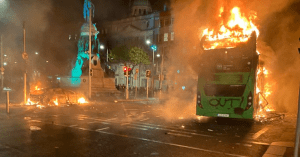Dublin riots – condemning the far-right is not the solution it appears to be
 At the time of this article’s publishing, it will have been two weeks to the day since the horrific stabbing of three young children and a female staff member took place outside a Gaelscoil in Dublin 1. It will also have been exactly two weeks since the spate of riots that broke out in response to this attack ravaged the streets of Dublin, drawing widespread shock and attention both at home and abroad.
At the time of this article’s publishing, it will have been two weeks to the day since the horrific stabbing of three young children and a female staff member took place outside a Gaelscoil in Dublin 1. It will also have been exactly two weeks since the spate of riots that broke out in response to this attack ravaged the streets of Dublin, drawing widespread shock and attention both at home and abroad.
By now, we will all have heard the major details of these riots. Crowds gathered in violent protest, throwing fireworks, flares, and bottles at buildings and Gardaí. Ordinary working people being harassed. A number of stores broken into and looted, and several – in addition to Garda vehicles, buses, and Luas tracks, etc – even set alight.
Over the past two weeks, we will have also heard a lot of discourse analysing these riots; how did things devolve into such chaos and who exactly is responsible? The answer that has been touted, across media commentary, public musings, and political statements, by and large seems to point the finger at the same group – the far-right.
When news of the stabbing attack first broke, with it came rumblings and unconfirmed reports that the perpetrator responsible was an immigrant (in reality, the attacker is a naturalised Irish citizen, who has lived here for two decades). But nevertheless, this (inaccurate, and frankly irrelevant) detail was fuel enough to light a fire under far-right agitators, who upheld the incident as exemplifying the threat they claim foreign immigrants pose, particularly to women and children.
This is nothing new. These agitators used Ashling Murphy in the same way when her murder occurred last year, and again recently, when the tragedy came back into topicality due to the trial.
But what perhaps was new, or at least just didn’t require any digging for the average person to come across this time around, was the utterly boldface xenophobic contempt and incitement to violence seen online from far-right agitators, and later, rioters too.
Normally, even those more towards the ends of the political spectrum aim to maintain some kind of plausible deniability that they’re not coming from a place of bias or hatred, instead acting on genuine, rationalised political beliefs. But in this case, given the nature of the sentiments being thrown around online and in the riots – Telegram voice notes encouraging those taking to the streets to “tool up and kill any foreigner”, anti-immigration and xenophobic chants and threats at the riots, etc – it is impossible to deny the major part hate played in bringing about the scenes we saw two weeks ago.
And again, this is not something that has gone unchecked. The far-right has been expressly and explicitly condemned for their role across pretty much all discourse on the topic, and rightly so. Failing to properly acknowledge the problem Ireland is facing with the rising influence of the far-right, despite the increase in worrying incidents this had led to (such as library workers being harassed for stocking LGBTQ+ books and Dáil protests featuring mock gallows with Irish politicians), has only served to do us a disservice, leaving the path clear for such incidents to keep happening.
There is a good reason everyone is pointing the finger at the far-right right now. Ireland has already begun to suffer from the impact of their influence, and we do not want to go down the same road of rampant misinformation and hate that other countries have in recent years; we can see how that’s going.
However, as we analyse and come to terms with what occurred two weeks ago, I am wary that this finger-pointing seems to be where discourse stops.
Attributing the cause and blame of these riots solely to the big bad of the far-right and leaving it at that sidesteps entirely the possibility that any other factors contributed to what happened in Dublin. It sidesteps a number of important conversations that need to be had about what pre-existing grievances and lack of precautions allowed the city to devolve into such chaos within a few hours.
A violent attack against young children was always, no matter the context, going to cause the Irish public (and any sane person) to feel sick to the stomach, to feel outrage, and to want some sort of justice to be served. But this horrific incident did not occur in isolation. For how long have we been hearing about people feeling less safe in Dublin than ever before, about increases in violent attacks, even beyond the capital?
And for how long too have we been aware of the major failings within our justice system? For how long have we been steadily watching our Garda numbers dwindle, seen violent offenders slip through the cracks of our courts system or receive lenient sentencing, or seen the social causes of offending go completely unaddressed?
I wrote a piece a little while ago about an incident that occurred between far-right anti-immigration protesters and counter-protesters in Clondalkin. In it, I spoke about how the far-right is adept at taking legitimate grievances and weaponising them for their own agendas; the housing crisis continues to worsen so it must be the fault of asylum seekers, three young children are stabbed outside their school so it must be the fault of inherently violent foreigners.
If it seems like poor logic, it’s because it is. Because it’s not rooted in rational or empathetic thinking at all, it’s smoke and mirrors; claim anger over a certain reasonable issue to give you an in to blame it on something you’re already against. Not only does it afford that plausible deniability mentioned earlier – that you’re acting from a place of genuine, rationalised political beliefs, and not hate – but it also means that if someone has been feeling disenfranchised due to a certain issue the Government has failed to address, they may be more inclined to listen to the group that professes concern over the issue and is perpetually mad at the Government, regardless of the true intentions of that group or any harmful beliefs they may harbour.
I believe beyond a shadow of a doubt the far-right is to be condemned for their recent actions, but I am wary of the way that discourse about the riots is stopping at condemning them, because I don’t believe it is the solution it appears to be. It alone will not address any of the root causes for their increased popularity, nor any of the other factors that exacerbated the recent riots.
If we want to prevent a repeat of what we saw in Dublin, and if we want to ensure violent attacks on children are never again opportunistically weaponised for the sake of fuelling a politic agenda or giving someone an excuse to set a car on fire, condemning the far-right cannot be our entire, one-and-done solution. Condemn them out of principle all you want, and you’ll be right in principle, but the far-right will only continue to thrive so long as the social issues they exploit go unaddressed – solving these issues in tandem with condemning their harmful beliefs is what will bring us a lot closer to an actual, long-lasting solution.






